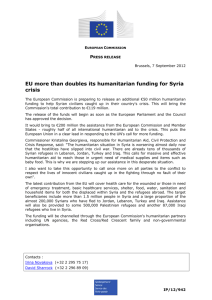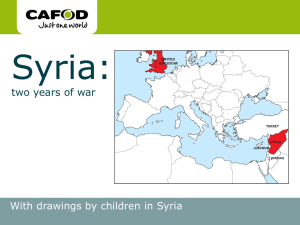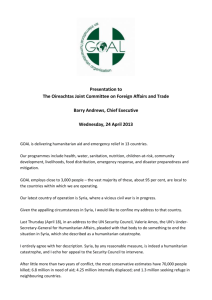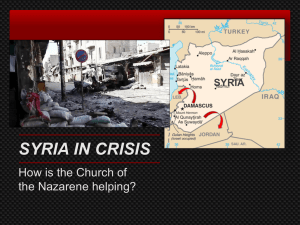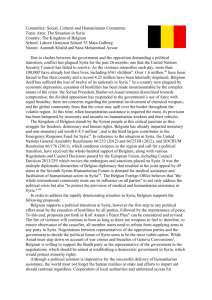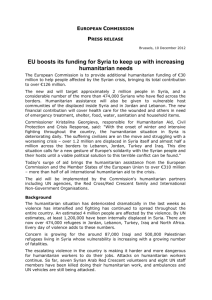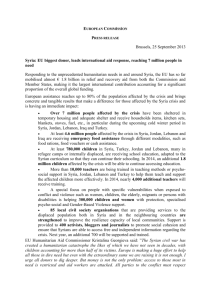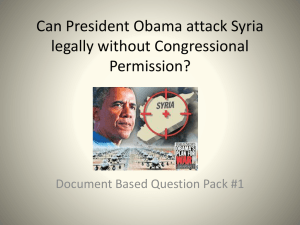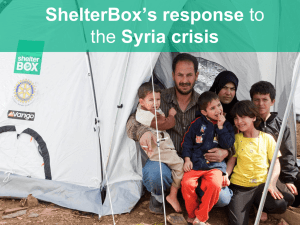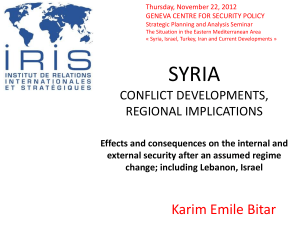The Syria Crisis
advertisement
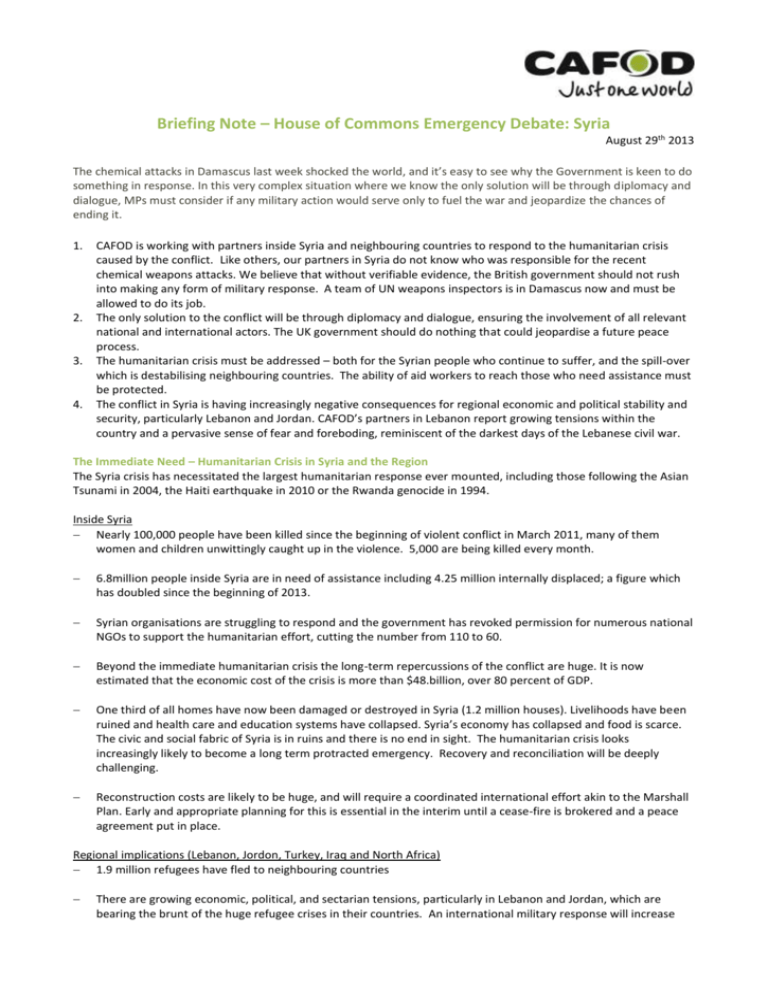
Briefing Note – House of Commons Emergency Debate: Syria August 29th 2013 The chemical attacks in Damascus last week shocked the world, and it’s easy to see why the Government is keen to do something in response. In this very complex situation where we know the only solution will be through diplomacy and dialogue, MPs must consider if any military action would serve only to fuel the war and jeopardize the chances of ending it. 1. 2. 3. 4. CAFOD is working with partners inside Syria and neighbouring countries to respond to the humanitarian crisis caused by the conflict. Like others, our partners in Syria do not know who was responsible for the recent chemical weapons attacks. We believe that without verifiable evidence, the British government should not rush into making any form of military response. A team of UN weapons inspectors is in Damascus now and must be allowed to do its job. The only solution to the conflict will be through diplomacy and dialogue, ensuring the involvement of all relevant national and international actors. The UK government should do nothing that could jeopardise a future peace process. The humanitarian crisis must be addressed – both for the Syrian people who continue to suffer, and the spill-over which is destabilising neighbouring countries. The ability of aid workers to reach those who need assistance must be protected. The conflict in Syria is having increasingly negative consequences for regional economic and political stability and security, particularly Lebanon and Jordan. CAFOD’s partners in Lebanon report growing tensions within the country and a pervasive sense of fear and foreboding, reminiscent of the darkest days of the Lebanese civil war. The Immediate Need – Humanitarian Crisis in Syria and the Region The Syria crisis has necessitated the largest humanitarian response ever mounted, including those following the Asian Tsunami in 2004, the Haiti earthquake in 2010 or the Rwanda genocide in 1994. Inside Syria Nearly 100,000 people have been killed since the beginning of violent conflict in March 2011, many of them women and children unwittingly caught up in the violence. 5,000 are being killed every month. 6.8million people inside Syria are in need of assistance including 4.25 million internally displaced; a figure which has doubled since the beginning of 2013. Syrian organisations are struggling to respond and the government has revoked permission for numerous national NGOs to support the humanitarian effort, cutting the number from 110 to 60. Beyond the immediate humanitarian crisis the long-term repercussions of the conflict are huge. It is now estimated that the economic cost of the crisis is more than $48.billion, over 80 percent of GDP. One third of all homes have now been damaged or destroyed in Syria (1.2 million houses). Livelihoods have been ruined and health care and education systems have collapsed. Syria’s economy has collapsed and food is scarce. The civic and social fabric of Syria is in ruins and there is no end in sight. The humanitarian crisis looks increasingly likely to become a long term protracted emergency. Recovery and reconciliation will be deeply challenging. Reconstruction costs are likely to be huge, and will require a coordinated international effort akin to the Marshall Plan. Early and appropriate planning for this is essential in the interim until a cease-fire is brokered and a peace agreement put in place. Regional implications (Lebanon, Jordon, Turkey, Iraq and North Africa) 1.9 million refugees have fled to neighbouring countries There are growing economic, political, and sectarian tensions, particularly in Lebanon and Jordan, which are bearing the brunt of the huge refugee crises in their countries. An international military response will increase spill-over of the humanitarian crisis. Official Lebanese government figures for August 27th reported a net entry of 4,000 refugees fleeing across the border in one day alone. Towards a Long-Term Solution The alleged use of chemical weapons and the scale of the humanitarian emergency highlight the need for a solution to an increasingly dangerous and unstable conflict that has significant regional and potentially global consequences. In responding to atrocities, global powers should tread very carefully and should consider the views of those in Syria: CAFOD’s church partners, inside Syria and across the region, are clear that the only lasting solution is a political settlement, arrived through dialogue and diplomacy. All major international actors and institutions have echoed this call and it must remain the objective. The British government should remain committed to the Geneva Peace Process. Our partners inside Syria do not know who was responsible for the recent chemical weapons attacks. Without hard evidence, the UK should not rush into taking any form of military action and must continue to work towards peace. “This [potential military response] exposes thousands of people to more dangers. Further wars have never been the answer; political might and influence however have given better and more peaceful results. We pray that peace will reign” – Father Simon Faddoul. President of Caritas Lebanon A Military Response – The Key Questions: In responding to this protracted crises and its immediate atrocities, it is vital that the following issues are raised and sufficiently addressed: Evidence – Clear and irrefutable evidence proving what happened and who was responsible must be presented. This is yet to happen. Our partners in Syria do not know who is responsible. A team of UN weapons inspectors is in Damascus trying to establish the facts – they must be given the time to do that. Key Question: Is there clear and irrefutable evidence on which to base any response? Humanitarian Crisis – This is already the biggest humanitarian crisis of the 21st Century and the most expensive response ever mounted, only exacerbated by recent developments. In responding to this crisis we must ensure that we neither worsen the humanitarian situation nor prevent aid agencies from providing life-saving aid. Key Question: Will military action improve the humanitarian situation or the ability of aid agencies to provide help based on the humanitarian principles of humanity, neutrality, impartiality and independence or will it make it worse? Political Solution – All major global powers and institutions agree that a political settlement is the only long-term solution and have committed themselves to a Geneva 2 Peace Conference. This must happen. Key Question – Will military action make dialogue and a political solution more or less likely? International Perspectives: “It is not confrontation that offers hope to resolve problems, but rather the ability to meet and dialogue. I launch an appeal to the international community to be more sensitive to this tragic situation and to commit itself to the maximum to help the dear Syrian nation find a solution to a war which spreads destruction and death.” Pope Francis “It is essential to establish the facts. A UN investigation team is now on the ground to do just that. Just days after the attack, they have collected valuable samples and interviewed victims and witnesses. The team needs time to do its job” UN Secretary General, Ban Ki-moon “It is a very critical time to our area of the world...Death, misery, displacement, homelessness, pain, and suffering have taken their toll on our lives. Any further escalation will render the situation detrimental in Syria and Lebanon. Any possible strike could impact the Lebanon directly with 1.5 million refugees on its soil and an open border that is impossible to close. We can't disregard also the involvement of Lebanese in the war in Syria, a matter that exposes thousands of people to more dangers. Further wars have never been the answer; political might and influence however have given better and more peaceful results”. Father Simon Faddoul. President of Caritas Lebanon For further information contact Anne Street on 07909927832 or Dominic Goggins on 07557268064

